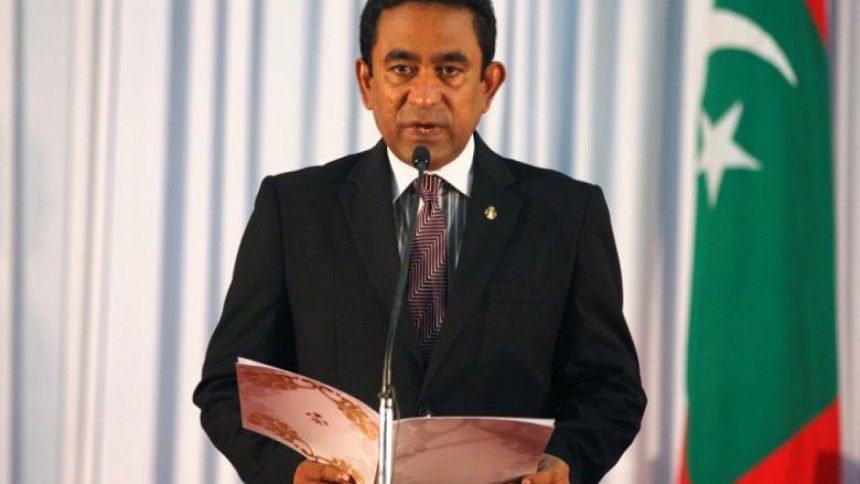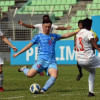Crisis in paradise and death of free speech

In a survey this year, Maldives secured the highest rating as the most coveted "dream honeymoon resort" But away from the islands of shimmering beaches and overwater bungalows on a sparkling lagoon, its capital, Male', is in a political crisis under an increasingly oppressive regime.
After a series of actions that led to human rights abuses, the government has now muzzled the press and freedom of expression. This started in March 2016 when news of corruption of over US$30 million leaked out. President Yameen was alleged to have been responsible, with ministers and MPs benefitting from the heist.
A bill to criminalise 'defamation' was immediately proposed by President Yameen and his supporters. Upon hearing this, journalists campaigned against it, claiming that it was designed to kill press freedom and pointed out that it would also threaten online debates on political issues. Their slogan, "In defence of 27", referred to the provision in the Constitution guaranteeing freedom of speech. In April, the police arrested some 18 persons from a 'sit in protest' and on July 26 broke up a silent protest by journalists.
Amnesty International called the government to stop enacting the bill into law, as it would have a "stifling effect on the right to freedom of expression".
Disregarding widespread public outrage, the bill was placed before the Majlis (Parliament) on August 9. Around 47 MPs out of the 78 present voted in favour, and the bill became law. MPs of the ruling PPM party defended it on religious grounds, claiming that "protecting one's good name was an Islamic tenet" and accused journalists of "defaming politicians".
The bill imposes punitive measures on those who wish to exercise their democratic rights and freedom. The penalties are US$ 130,000.00 for slander and criticism of the government or a jail sentence of six months for those who are unable to pay the fine. Journalists are barred from reporting allegations if the accused refuses to respond. This is a 'Catch 22' situation, as the accused persons would risk government anger if they did respond.
Maryam Didi, an MP of former president Mohamed Nasheed's MDP, has termed August 9 a "dark day" in the history of the country, since the Constitution was violated and citizens deprived of their rights.
The bill sparked fierce criticism from USA, UK, EU, Germany, Norway and Netherlands. They condemned it as a "serious setback to free speech" in the Maldives. They urged President Yameen to nullify the bill and establish a democratic government immediately. This went unheeded, even though some MPs of Yameen's own People Progressive Maldives (PPM) criticised it.
The PPM is headed by President Yameen's half brother Maumoon Abdul Gayoom, who had been president for 30 years. Gayoom himself criticised Yameen for the bill and news of this leaked out. MPs loyal to Gayoom stated, "A president is a servant of the people and criticism of his actions does not amount to slander". However, Yameen boldly claimed that it did not contradict international law! One wonders to which international law he was referring.
The relationship between Mamoun Abdul Gayoom and his half brother President Yameen has been cooling for several months. Conflict over the leadership of the party has sharpened with Gayoom's refusal to endorse Yameen as a presidential candidate in the forthcoming 2018 election without a primary. The party has fractured into two. Gayoom's son, Faras, was expelled from the PPM for voting against a bill authorising the government to award islands for sale without the required bidding process. A source from the opposition MDP party pointed out that this could allow countries like China to establish military bases in the Maldives, thereby risking destabilising the power dynamics of the Indian Ocean.
Gayoom retaliated to the expulsion of his son by suspending the PPM Committee and launching a reform agenda, claiming that the Majlis was endorsing legal changes that were leading to massive corruption. This, in turn, led MPs loyal to Yameen to file a lawsuit seeking to invalidate Gayoom's reform agenda.
In July, Foreign Minister Dunya Mamoun, daughter of Mamoun Abdul Gayoom, resigned, citing her opposition to capital punishment, which the government adopted in May 2016, as the grounds for her resignation. But local media connected the resignation to the conflict between her father and Yameen, his half brother. This game of political party roulette is spinning.
In a surprising step, the government on August 11 switched off the first private Dhi Television channel of Maldives. Dhi TV's last broadcast was at midnight. It was just a day after the Majlis had endorsed the bill crirminalising 'defamation'. Phi FM, a radio station linked to the TV station, and a Dhivehi online website were also ruthlessly switched off.
But that was not all. In another move. it was announced on August 11 by the government that the Maldivian Defence Forces were barred from meeting or interacting with ministers, political activists, foreigners and diplomats without permission from senior military officials.
This curb on the Defence Forces came in the midst of a further intensification of the political crisis as the 'Maldives United Opposition', a number of political parties and former senior bureaucrats, are determined to remove Yameen from office.
Currently, the judiciary is compromised; the rule of law fractured; freedom of press severely curtailed; and democracy a farce.
As early as February 24, 2016, the Commonwealth Human Rights Initiative (CHRI) and the Commonwealth Ministerial Action Group (CMAG) had called for reform. But Yameen continued his ruthless actions to remain in power. Maldives is now on the formal agenda of the CMAG. The country needs to acknowledge the gravity of the Commonwealth's concern regarding the deterioration of all democratic values. Unless reversed, the deterioration could lead to suspension or expulsion from the Commonwealth and provide ample justification for sanctions on the island state by the world community.
With increased pressure from within the Maldives and by the outside world, President Yameen may soon find that he has very little room left to manoeuvre.
The writer is former Bangladesh High Commissioner to the Maldives.

 For all latest news, follow The Daily Star's Google News channel.
For all latest news, follow The Daily Star's Google News channel. 








Comments